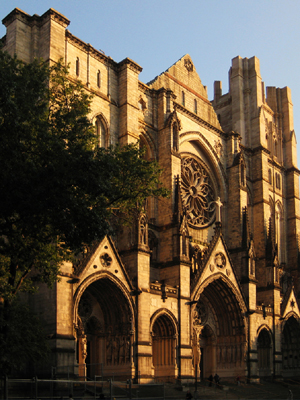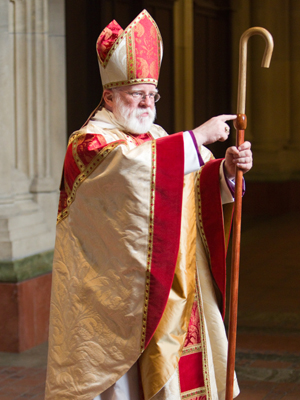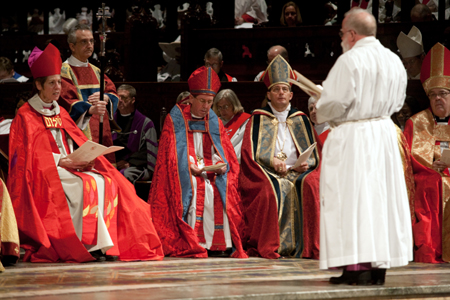| |
 |
 |
 |
| Comment on this report, or find other reports. |
 |
| Our Mystery Worshippers are volunteers who warm church pews for us around the world. If you'd like to become a Mystery Worshipper, start here. |
 |
| Find out how to reproduce this report in your church magazine or website. |
|
|
| 2352: Cathedral
Church of St John the Divine, New York City |
 |

Photo: ©
William Porto and used under license |
 |
Mystery
Worshipper: Acton Bell.
The church:
Cathedral
Church of St John the Divine, New York City.
Denomination:
The Episcopal
Church, Diocese
of New York.
The building:
Much has been written about this cathedral, which is the world's
largest Gothic church. Begun in 1892, it remains unfinished.
Everything about the cathedral is colossal, from the nave more
than two football fields in length, to the 165 feet tall dome
at the crossing (which could comfortably hold the Statue of
Liberty). Wide steps lead up to five arched portals over the
central doors. Called the Portal of Paradise, it depicts St
John witnessing the Transfiguration. Above that is the great
rose window, the largest stained-glass window in the United
States. The three-ton bronze doors with scenes from the Old
and New Testaments are opened twice a year at Easter and St
Francis Day. The altar area includes two giant 18th-century
menorahs and 16th-century Shinto vases. Barberini tapestries
dating from the 17th century decorate the walls of the crossing.
The church:
The cathedral is very active in the community and offers many
social services, including a soup kitchen, emergency intervention
programs, a clothing bank for underprivileged women entering
the workforce, and a multitude of arts programs and concerts,
all of which are detailed on their website. They also house
the Textile Conservation Laboratory, which is a world-class
institution for the conservation of delicate tapestries and
fabrics of antiquity.
The neighborhood:
The cathedral is in the Morningside Heights neighborhood, which
is now made up largely of Columbia University and Barnard College
as well as several other educational institutions. Morningside
Heights is one of the highest points on Manhattan Island, and
it played a strategic role in the Revolutionary War. In September
1776 the battle of Harlem Heights, which marked the first victory
for the Continental army directly under George Washington's
command, was fought only a few blocks away from where the cathedral
now stands.
The cast:
It really was a cast of thousands! The Most Revd Katharine Jefferts
Schori, Presiding Bishop of the Episcopal Church, was the chief
consecrator and presider. Co-consecrating bishops included the
Rt Revd Mark Sisk, Bishop of New York; the Rt Revd George Edward
Councell, Bishop of New Jersey; the Rt Revd Richard Frank Grein,
retired Bishop of New York; the Rt Revd Lawrence Provenzano,
Bishop of Long Island; the Rt Revd Wendell Nathaniel Gibbs,
Bishop of Michigan; the Rt Revd Catherine S. Roskam, retired
Bishop Suffragan of New York; and the Revd Robert Alan Rimbo,
Bishop of the Metropolitan New York Synod of the Evangelical
Lutheran Church in America. But the star of the show was the
Rt Revd Andrew Dietsche, who was elected bishop coadjutor of
the Diocese of New York in November 2011 and whose consecration
was taking place today. As bishop coadjutor, Bishop Dietsche
has the automatic right of succession to Bishop Sisk, who must
retire before his 72nd birthday in August 2014. The bishops
were assisted by about a dozen and a half deacons as well as
several presenters and readers.
The date & time:
Saturday, March 10, 2012, 10.30am.
What was the name of the service?
The Consecration of Andrew Dietsche as Bishop Coadjutor of the Diocese of New York.
How full was the building?
Impossible to count, but I estimate slightly more than 3000
present (the cathedral can hold more than 5000). Two-thirds
of the cathedral was reserved seating, with the final third
reserved for the general public. I was lucky to find a seat
in steerage in the very back of the cathedral, in the last row,
but not before I was rudely ejected from a seat I had innocently
taken in the reserved section (see below).
Did anyone welcome you
personally?
Not the warmest welcome, as a very surly security person practically
throttled me for sitting in the reserved section – a section,
I might add, that was not clearly marked as off limits. I seriously
contemplated leaving after our encounter.
Was your pew comfortable?
It was a small plastic chair, probably more comfortable for
use during shorter services. There was definitely a lot of adjusting
going on in my section as we approached the three hour mark.
How would you describe
the pre-service atmosphere?
All the hustle and bustle one would expect with a crowd this
big. I did notice that I wasn't the only one accosted by security.
Pretty thuggish, actually. I hope the forces hearkened well
to the opening words of the service.
What were the exact opening
words of the service?
"Bless the Lord, who forgives all our sins."
What books did the congregation use during the
service?
There was a very complete service booklet provided.
What musical instruments
were played?
Organ, piano, guitar, cello, trumpets, drums, steel drums, bar
chimes, and a choir of several hundred, drawn from all over
the diocese. Musically the service was all over the place: Strauss
and spirituals for the preludial music; "Oh Happy Day" and "Enter
into Jerusalem" on steel drums for the processional; several
old chestnut hymns – "Gracious Spirit, it gives your servants
joy," "Precious Lord take my hand," "Come down O love divine";
a 1970s Taize community hymn on piano with glissandi on the
bar chimes at the consecration; and a folkish, singing-nun-style
mass setting with guitar accompaniment. I was bummed that with
a choir this large we didn't get something big and grand such
as "Guide me, O thou great Jehovah."
Did anything distract
you?
With so many people in one place, it was easy to get lost in
all the shuffle. It also seemed that everyone had a different
pronunciation for the word "coadjutor," and I started to tic
off the many different ways it was being said. The biggest distraction,
however, was the elderly couple sitting next to me. The wife
offered a loud running commentary of the service in response
to her deaf husband's grunts, which I at first found annoying,
but then started to enjoy immensely, since it was really, really
off-the-wall fun. In answer to her husband's confusion over
the many languages used in the litany of ordination, she said,
"Just be quiet. It's not English, so it can't be very important."
Calling the jazzy Taize Hymn "a little bit of Peaches &
Herb" (a reference to the disco duo from the 70s known as the
"Sweethearts of Soul") made me laugh out loud. This
garnered some dirty looks from those around us, but I really
wasn't expecting a sweet little old lady to reference classic
disco. When they placed the mitre on the the newly-minted bishop,
she said, "Oh look, it's St. Nick! The Christmas pageant is
never going to be the same." (I couldn't argue with her, because
Bishop Dietsche really did look like Santa Claus.) At a certain
point I had to remind myself to stop jotting down what she was
saying and take notes on the service. That was especially hard
during the sermon, as based on her comments I was pretty sure
we were hearing two different homilies.

Photo: Kara Flannery, Episcopal
Diocese of New York
Was the worship stiff-upper-lip,
happy clappy, or what?
It was all pretty reserved for the cathedral – no giant
bendy poles, wind socks, puppets, liturgical dancers or other
such ornaments that one usually finds there at the big events.
But the steel drums at the processional gave everything a kind
of carnival feel. The litany for ordinations was delivered in
the many different languages that make up worship in the diocese:
Malayalam, American Sign Language, Creole, Japanese, Akan, Spanish
and French. The first reading was in French, the second in English.
The gospel was read in both English and Spanish. After his consecration,
the new bishop coadjutor gave a short speech and introduced
his family. The peace was an extended meet n' greet. Communion
was a bit of a scrum, as it didn't seem that ministers were
all that familiar with where they should stand. It seemed to
take forever, needlessly extending what was already a long service.
The recessional was thankfully short, since it was reduced to
just the bishops and not all of the clergy present.
Exactly how long was the
sermon?
12 minutes.
On a scale of 1-10, how good was the preacher?
8 – I find The presiding bishop more effective a preacher
in smaller, intimate spaces, as her understatement can read
as a lack of effect in bigger ones, but what I heard was certainly
smart and well-reasoned.
In a nutshell, what was the sermon
about?
Riffing on the gospel reading of the day, John 21:9-17, where
Jesus exhorts Simon Peter to "feed my lambs," Bishop Jefferts
Schori used that line to talk about the role of leadership in
the church. It is necessary to be a leader for all, not just
a few, and that would include those unbaptized. The health of
our garden is in some danger, with food, water, education and
employment challenges. Some would feel that the pasture is for
the chosen ones' exclusive use, yet a good leader has a duty
to lead all to new pastures. Health and vitality require the
new; and justice requires change.
Which part of the service was like being in
heaven?
Such a grand ceremony in a grand setting.

Photo: Kara Flannery, Episcopal
Diocese of New York
And which part was like
being in... er... the other place?
A security officer was in the recessional, following the new
bishop out. On the whole, I thought that the security was so
darn intrusive, and completely unnecessary. We all get what
it means to live with heightened security, especially in New
York City, but I did wonder if the new bishop coadjutor was
so unpopular a choice that there was some belief that after
a nearly three hour service someone in the congregation was
going to jump up and whack him.
What happened when you
hung around after the service looking lost?
A couple of hundred people had left immediately after the consecration,
so there wasn't quite the mad rush for the exits. Even so, some
ushers giving directions to the reception that was to follow
would have been helpful. There were a lot of people standing
around looking a bit lost.
How would you describe the after-service
coffee?
There was a big reception on the cathedral close in a large
tent set up with refreshments, and another area for the overflow
set up in the little-used synod house. The tent was a bit of
a zoo, so I ambled over to the synod house, which was only slightly
less populated. (I have to say I was a bit surprised by the
state of disrepair of the synod house.) I hung around for a
bit chatting with some folks I knew, then headed out, since
it had been a very long day. On the way out I passed one of
the peacocks that live on the close. I was glad to see that
he seemed oblivious to the crowd on his front lawn.
How would you feel about making this church your regular (where 10 = ecstatic, 0 = terminal)?
Really impossible to tell what the permanent congregation is
like from this service. I will say that the space is so over-the-top
grand that it is perfect for big events such as this.
Did the service make you feel glad to be a
Christian?
Yes, as the idea that these big ceremonies mean something different
to each of those attending was thrown into high relief.
What one thing will you remember about all this in seven days' time?
How much fun I was having listening to the event play-by-play
given by the lady next to me. What a scream. |
|
|
 |
 |
 |
| We rely on voluntary donations to stay online. If you're a regular visitor to Ship of Fools, please consider supporting us. |
 |
 |
 |
| The Mystery Pilgrim |
 |
| One of our most seasoned reporters makes the Camino pilgrimage to Santiago de Compostela in Spain. Read here. |
 |
 |
 |
| London churches |
 |
| Read reports from 70 London churches, visited by a small army of Mystery Worshippers on one single Sunday. Read here. |
| |
|
|
|
|


